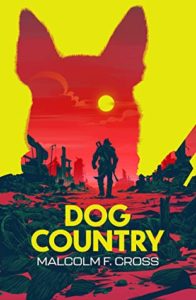
Dog Country came into the Semifinals of the Self-Published Science Fiction Competition (SPSFC) with the highest first-round score of any book in the competition. Though it promised quite a bit more war than I usually prefer in my fiction, the focus on psychological trauma and the glowing first round reviews had me especially excited to read Malcolm F. Cross’ debut novel, and what I found was exactly the sort of story that makes self-published fiction so appealing.
Dog Country follows Edane, a genetically engineered anthropomorphic dog—canonically a furry, but if you have negative furry stereotypes, don’t let them keep you from this story—who was designed to be a soldier and is struggling to transition to civilian life after being maimed and nearly killed in his previous deployment. He’s fighting both to get used to transplanted limbs that haven’t integrated quite thoroughly enough for him to operate on the physical level he’s come to expect and also to build a life with a girlfriend whose desire for romance and sex baffles him. Meanwhile, there’s war brewing in Azerbaijan, where Edane’s engineered brothers seek a theater in which to fulfill the purpose they were created for, and which will provide Edane the chance to exorcise the ghosts of his own past.
While Dog Country isn’t a perfect book, it’s my favorite of the first 36 that I’ve tried in my SPSFC judging capacity, and it’s exactly the sort of book that I’d hope to uncover in this sort of competition. While the plot does open up into something more like a traditional war story in the back half, a good 40% of the book is spent on a character study of a neurodivergent, asexual, anthropomorphic dog with PTSD. I know that traditional publishers are pushing to diversify, but this isn’t a book I’d expect to find anywhere outside an indie setting.
Of course, it’s all for naught if the character study isn’t good, but readers of Dog Country have nothing to worry about on that score. Edane springs off the page, with clipped narration priming the reader for a character that hyperfocuses on the minutiae of combat simulations but struggles to understand the very basics of interacting with broader society, despite his sincerest efforts to meet his girlfriend where she is. His earnestness makes him a sympathetic figure even as his neurological wiring make his problems seem at times insurmountable. Prospective readers need to be prepared for a plot-light beginning and a lead far outside the norm, but those who are will be rewarded with an immersive journey in the life of a character who is hard not to like.
But there was always war on the horizon, and it’s hardly a spoiler to say that Edane gets the call, deploying to Azerbaijan as part of the dog-equivalent of the rank-and-file. His perspective on the ground is supplemented by another of his brothers, one who helped organize their hire by oppressed citizens yearning to be free of a tyrannical regime. This second point-of-view gives the reader a more complete picture of the conflict, but it just doesn’t have the vibrancy of the one we spent nearly half the novel getting to know. Both the zoomed-in and the big picture sections of the war story seemed reasonably well done individually, but even though they took place at the same time and in the same conflict, they had the feel of two separate plots awkwardly sharing a single novel. Even as someone who doesn’t care all that much about the details of battle, I was mostly invested in the character who had been painstakingly brought to life in the first part of the story, and I probably would’ve enjoyed the story with the big picture sections excised entirely.
Both plotlines had conclusions that felt like they may have come a hair too quickly, but which were still emotionally satisfying and well-justified by the work done to that point. It wasn’t an ending that particularly elevated the book over what it had been before, but neither was it an ending that detracted from the story as a whole.
Overall, the feeling of discontinuity between the two main plot threads keeps me from making this the first five-star book of my SPSFC judging tenure, but the outstanding work building such a fascinating lead character makes it my clear favorite of the first two rounds. The plot-light opening and intense examination of the trauma of war will doubtless be a turnoff to some readers, but I sincerely hope it finds enough fans among other judges to send it to the finals, and that its SPSFC performance finds it some fans outside the competition as well.
Recommended if you like: neurodivergent character studies, exploration of the traumas of war.
Can I use it for Bingo? It’s hard mode for Features Mental Health and Self-Published, and it also has No Ifs Ands Or Buts and features a Non-Human Main Character, a Revolution or Rebellion, Family Matters, and an Author Who Uses Initials. It might be an Award Finalist, and it might not win, but we’ll see.
Overall rating: 16 of Tar Vol’s 20. Four stars on Goodreads.
SPSFC Score: 8/10 for my personal score. We will await results from the other judges before announcing an official team score.
